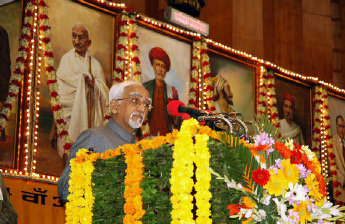Maritime security prime concern of nations: Ansari
 New Delhi, Feb 15: Vice President Hamid Ansari today said maritime security has been the prime concern of states and of their nationals undertaking international trade.
New Delhi, Feb 15: Vice President Hamid Ansari today said maritime security has been the prime concern of states and of their nationals undertaking international trade.
Addressing Chiefs/Heads of Navy of the entire Indian Ocean Region at the "IONS Seminar 2008" here today, Ansari said that in the past, piracy by entrepreneurs for themselves or on behalf of states was common.
"Then came a time when the balance of advantage was found to lie in the suppression of piracy. The same pattern was followed in regard to slave trade. Economic interests and prevailing moral norms played and continue to play a role in shaping perceptions as is evident by the present-day measures against narcotics," he added.
Ansari said that some with no doubt recall that in another age a great European power used its military superiority to dump opium on an Asian people in order to correct trade imbalance.
In this globalised world of today, 95 per cent of world trade is conducted through the sea and around 100,000 ships transit the expanse of the Indian Ocean annually, he pointed.
"Roughly the Straits of Malacca account for 40 per cent of this sea-borne trade. The Persian Gulf and adjoining region accounts for 50 per cent of the world’s containerised cargo and 33 per cent of bulk cargo," Ansari added.
He said that maritime security is to be considered at three levels: Measures to create transparency, measures to build confidence, and measures to build security.
"IONS-2008, I venture to hope, is indicative of a broad acceptance of the need to take these three sets of measures to further maritime security in the Indian Ocean Region," Ansari said.
The Indian Ocean Region is among the fastest growing regions of the world and the existing structure of cooperation in this broad region is primarily based around five groupings, namely ASEAN, GCC, SAARC, SADC and SCO, he said.
"These are not formally linked to each other; their overlapping and overarching framework is an implicit recognition of each other’s sensitivities and concerns. It is also reflective of the tenuous equilibrium of the region," Ansari said.
"An earlier effort, to create an Indian Ocean Rim grouping, did not produce the desired results. Within the region, and around it, are important political and economic powers that have a stake in peace, stability and progress. They could form the nucleus of an eventual Asian Economic Community," Ansari added.
He said that India is and will remain a maritime nation, keeping with its maritime heritage, its overseas presence would be based on its soft power and cooperation.
The first Conclave of Chiefs has been a success and throws up numerous positives for future. All attendees were fully supportive of the concept of IONS.
The conclave agreed to a broad consensus that will be the guiding arrangement until the formal Charter is finally signed.
The consensus reached on the following points: The Symposium of IONS (including the Conclave of Chiefs) will meet every two years.
- The Chairmanship (and Secretariat) will rotate. The next venue would be on the agenda at the Goa session.
- Cooperative endeavours such as humanitarian assistance and disaster relief will be the immediate core area of thrust. A seminar for young officers was also agreed to.
- Categories of membership was accepted in principle and it was further agreed that observers would be accepted only by common consensus.
IONS draws inspiration from the US-backed Western Pacific Naval Symposium that engages Southeast and East Asian countries to leave an 'engagement' deficiency in the Indian Ocean, particularly in the western Indian Ocean.
The Indian Ocean Naval Symposium Seminar 2008 is being conducted jointly by the Indian Navy and the National Maritime Foundation.
Even after the seminar’s conclusion its proceedings, the ‘Conclave-of-Chiefs’, will continue, on February 15 and16, with the venue shifting to Goa. They will visit INS Hansa, the naval air station there. (ANI)